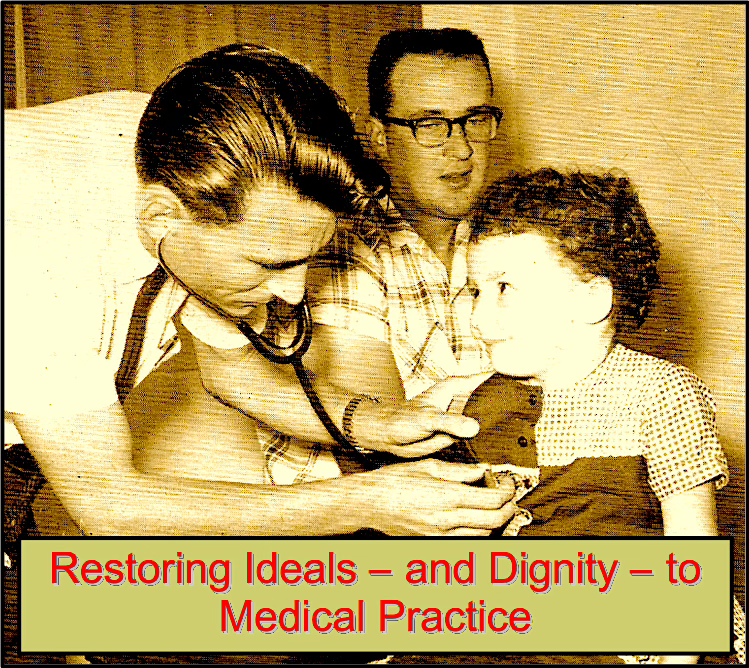Restoring Dignity to Medical Practice
“When the power of love overcomes the love of power
the world will know peace.” - Jimi Hendrix
Medicine is based on the well-known ideal of the Golden Rule. “Do unto others as you would have done unto you,” we have heard taught by Jesus. “Treat other people the way you want to be treated.” What demonstrates this ideal better than helping sick or injured people regain their health?
While helping sick people is noble, many today say that ideals are too abstract, too impractical to apply to the field of medicine. Others say that business and political concerns have driven ideals from medicine like deer before a forest fire. How can we bring ideals back to the practice of medicine?
We often learn ideals by hearing about people who are good examples. These people dedicate their lives to their profession. The quality of their work leaves an impression on our culture that inspires those who follow when they are gone. No one in the history of medicine has surpassed the excellent primary care offered by the General Practitioner doctors.
Forty years ago, the last of the fabled General Practitioner physicians were widespread. The GPs were trained in an era where all doctors learned a broad range of family medicine. Doctors who wanted to specialize had to master that formidable body of knowledge first – only then could they go on and train to become specialists. The GP focus was on families – children and adults alike.
That system of medical education and practice produced physicians who had an incredibly broad and deep skill set. They could handle anything from delivering babies to suture repairs; management of complex internal medicine problems to childhood diseases; and they practiced medicine day, night, and weekends. They often juggled an enormous office practice with concurrent care of many hospital patients.
The GPs also had a marvelous way with people. Those doctors had a magnificent personal touch. They seldom rushed anyone, and they never gave their patients less than complete respect. Those doctors made the effort to know their patients as complete human beings. Then - and only then - did they prescribe remedies. The GPs were not cold, emotionless technicians; they were members of the family.
Where Did the General Practitioners Go?
Today, the doctor who treats your soul as well as your body seems outdated, something forever gone - like poodle skirts, soda fountain Coca-Cola, or the Chevrolets with big fins on the back. Nevertheless, the GPs today – even as a memory - tell us a lot about what people want in a physician.
Do they want knowledge and technical prowess? Certainly, but there is no substitute for your family doctor who knows you and treats you like a member of their family – like the GPs truly did. Time has passed, and now the GPs have either retired or passed on. But the memory of their contribution remains, and the high standard of the care they offered is legendary.
Many miss the old Chevys and the rest, but the doctor is different. Cars and soft drinks come and go, but nearly everyone needs a doctor’s care. When the doctor meets our needs, it is a wonderful healing experience, and we are deeply satisfied. Today, many people are far from satisfied; rather, they come away from medical care unhappy or even angry. What is different about today’s doctors? Why are so many patients dissatisfied?
One important difference between today’s doctors and those of forty years ago is specialization. Forty years ago, most doctors were broadly trained family doctors - the old GPs. They used their skills to care for everyone – any age, male or female, no matter what your health status.
The medical profession has changed since then. More doctors have specialized. Today many people complain that they cannot find a well-rounded family doctor. Instead, doctors refer patients back and forth from one specialist to another like ping-pong balls. Even with all the specialists, patients often fail to find the relief they seek.
Another difference is economics. The ongoing controversy about how to pay for medical care is one of the top hot-button issues of our time. We know that everyone needs medical care - for day-to-day problems, chronic conditions, and the major emergencies requiring hospitalization or surgery. The question of how to pay for medical care remains a Gordian knot that defies solution.
Because of economic pressures, many today see the doctor's role as anything but healing. People want the caring, healing physician like the old GPs, but feel that Ebenezer Scrooge is treating them. There is a perceived gap between what the public wants and what they see in today’s doctor. Whether this is truth or propaganda, the impact on today’s patient often causes disappointment and anger.
This is disconcerting - to say the least - to doctors. In previous eras the public regarded doctors as the cream of society's crop, leaders in morality, and champions of the public trust. How do we repair the damage that has occurred to the doctor-patient relationship?
Patients are equally nonplussed by changes in the healthcare system itself. Rather than getting great respect with comprehensive medical care at a leisurely pace, they are hurried through a system that often fails to respect the individual. I want to examine these issues - what is wrong? How did this situation develop? What can we do to improve things? How can we restore ideals - and dignity - to medical practice? Stay with me and we will explore these issues further.





